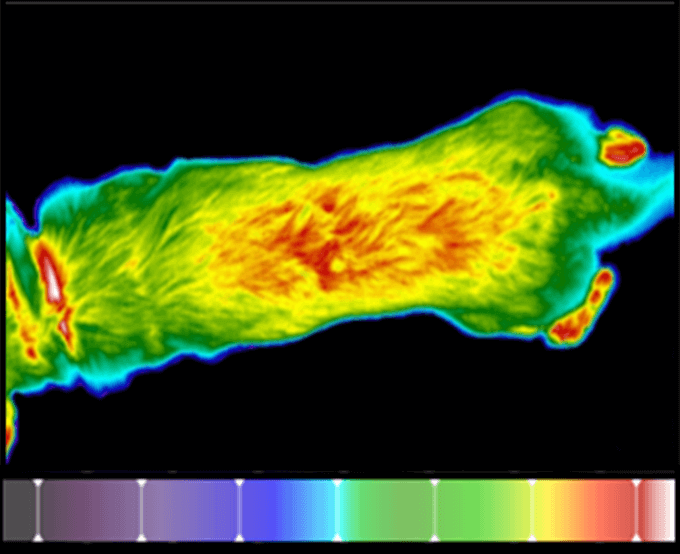Thoracolumbar Pain – Canine
Patient
German shepherd, 5-year-old
Problem
This patient had a history of reoccurring thoracolumbar pain.
Regional Screen with Digital Thermal Imaging
The patient was acclimated to room temperature, was not handled during acclimation, and remained calm during image capture. Multiple digital thermal images were captured with a Digatherm IR camera.
Interpretation of the Initial Thermal Image
The digital thermal image confirmed the physical exam findings by demonstrating an area of asymmetrical hyperthermia over T12 – L2 (Fig. 1).
Additional Diagnostics
Radiographs revealed slight narrowing of disc space T13 -L1. This location corresponded to the focal point of greatest hyperthermia noted with thermal imaging.
Treatment Plan
Application of laser therapy was prescribed at a dosage of 12 J/cm2 to be administered bilaterally throughout the paravertebral musculature from T6 – L5.
Follow-up thermal imaging four hours after the laser therapy treatment was prescribed to evaluate the response to laser therapy.
Interpretation of the Follow-up Thermal Image
Compared to the initial digital thermal image (Fig. 2), an image taken 4 hours after laser therapy (Fig. 3) showed a significant decrease in intensity and size of the areas of hyperthermia.
Clinical Evaluation After Laser Therapy
There was less pain upon digital palpation throughout the entire anatomical area. This correlates to a reduction in inflammation within these anatomical structures.
Value of the Digital Thermal Image
Client visualization of the digital thermal image contributed to client compliance with the recommendation of radiographs followed by treatment with laser therapy.
